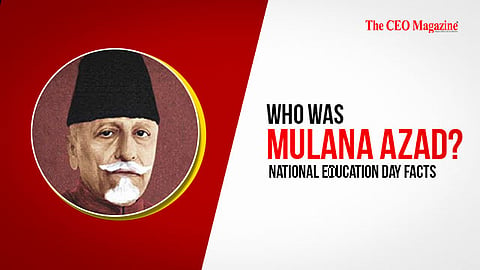
- News
- Women
- Magazine
- IndustryIndustry
- InsightsInsights
- Success Stories
- PublishPublish
- ContactContact
- Media KitMedia Kit

On 11th November 2021, India will witness the 13th National Education Day commemorating the birth anniversary of Maulana Abdul Kalam Azad or Mulana Azad. Today, Indians remember Mulana Azad for the contribution he had in establishing the foundation of education in post-independence India.
Maulana Azad was India’s first-ever Education Minister when the country got independence from the British raj. Born in Mecca which is today a part of Saudi Arabia, he was named Abul Kalam Ghulam Muhiyuddin originally.
He was the Islamic theologian and one of the major leaders in the independence movement of India. He was also a writer and a senior leader of the Indian National Congress. His name, Mulaza Azad is derived from two words “Mulana” meaning master and Azad meaning free.
Mulana, as a teenager, began writing and publishing his poetry and later articles in magazines. His trip to Egypt, Syria, Turkey, and France exposed him to several revolutionaries and developed political views. He incepted his journey as an Indian nationalist and started openly expressing his critical views of the British government.
He focused on encouraging young Muslims to fight for India’s independence and Hindu-Muslim unity. Even during the partition of Bengal in 1905, which he opposed, his revolutionary work helped several Hindus and Muslims.
He became part of the Khilafat Movement protesting the position of the Sultan of Ottoman Turkey, known as Caliph or Khalifa for Muslims worldwide who sided with the British in the war. This meant, the continuity of his rule was under serious threat and Muslim conservatives were distressed.
While his focus was on motivating Indian Muslims, his new journal, Al-Balagh, incepted in 1916 was banned under the Defence of India regulations Act, he was arrested, and restricted from entering the Bombay Presidency, United Provinces, Punjab, and Delhi. He was incarcerated in a jail in Ranchi until 1st January 1920.
He was released into India which was aggregated with the British for its Rowlett Acts, 1919 and killings of unarmed civilians at Jalliawala Bagh in Amritsar also in 1919. At the same time, the Khalifat movement was at its peak as Ottoman Empire was defeated in World War 1 and Turkish War Independence began.
Indian National Congress came under the leadership of Mahatma Gandhi who led a revolt against the British in 1918 supporting the farmers of Champaran and Kheda. He pioneered Satyagraha, mass civil disobedience with complete non-violence and self-reliance. He reached out to support the Khilafat struggle and bridge the Hindu-Muslim political divide.
He supported Gandhi in the non-co-operation programme, joined Congress and became the elected president of the All India Khilafat Committee. Although Azad and other leaders were arrested soon, the movement was driven by millions of people peacefully protesting, strikes, and protests.
This transforming phrase in Azad’s life led him closer to Gandhi and his beliefs along with his fellow Khilafat leaders, Mukhtar Ahmad Ansari, Hakim Ajmal Khan and others. He co-founded Jamia Millia Islamia in Delhi as an institution of higher education managed entirely by Indians without any British support or control with the two leaders.
While he set the foundation of Jamia Milia Islamia in 1920 at Aligarh in U. P., he assisted in shifting the campus of the university from Aligarh to New Delhi in 1934 and the main gate or Gate No. 7 to the main campus of the university is named after him.
At the age of 35, in the year 1923, he became the youngest person to serve as the President of the Indian National Congress. In 1928, Simon Commission, which included no Indian members sparked nationalist outrage across India. Azad endorsed Nehru Report, which was criticized by Ali Brothers and Muhammad Ali Jinnah.
Despite his friendship with Gandhi, Azad developed a close friendship with Nehru and began espousing socialism as the means to fight inequality, poverty, and other national challenges. During Gandhi's Dandi Salt March to protest Salt tax and restriction on production and sale, he organised a nationalist raid and was arrested along with millions of people who were released following the Gandhi-Irwin pact in 1931. He was also a part of Quit India.
He was India’s first Vice President. Post partition, he volunteered to make Nehru the Congress President and he was appointed as head of the Department of Education. Even though he opposed Partition, amidst the incidents of violence in 1947 and the popularity of the League along with the possibility of a civil war, he remained silenced during the AICC session in which the plan was approved.
· Azad was the mastermind behind the national programmes of school and college construction and spreading the enrolment of children and young adults into schools to promote universal primary education.
· In support of Nehru’s socialist economic and industrial policies, Azad also extended social rights and policies for women and underprivileged children.
· As India's first Minister of Education from 1947 to 1958, he emphasised educating the rural poor and girls.
· Azad, as Chairman of the Central Advisory Board of Education, supported adult literacy, universal primary education, free and compulsory for all children up to the age of 14, girl's education, and diversification of secondary education and vocational training.
Follow us on Google News
